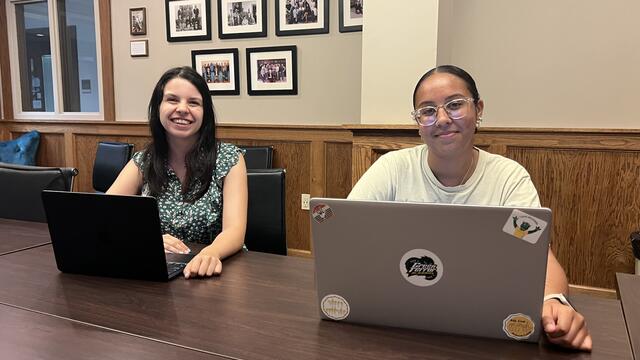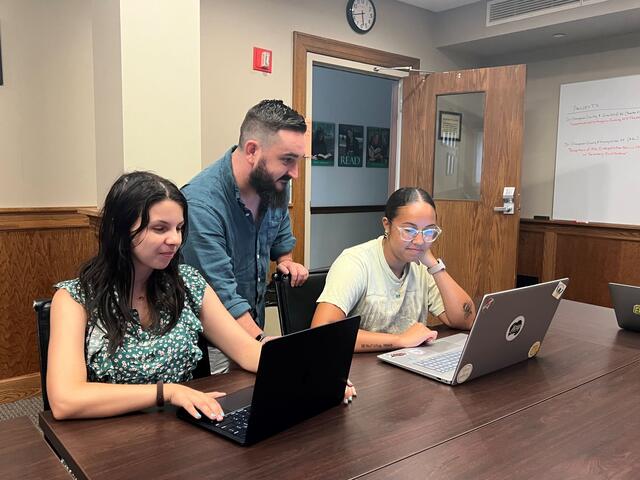A summer of research discoveries in American Sign Language, Theatre, and Accounting
Inspired by their majors, two students in the Student-Faculty Collaborative Summer Research Program launched studies in underrepresented fields. With guidance from Lecturer and Director of First-Year Composition Alexander Champoux-Crowley, the students investigated theatre funding and interpreters in secondary education.

Theatre Arts and Accounting major Grace Hill (left) and American Sign Language major Marley Wilson (right) collaborated with Lecturer Alexander Champoux-Crowley to develop and launch research surveys in their respective fields of study.
Unlike in the sciences, it can be hard to picture what research for American Sign Language (ASL), Theatre Arts, and Accounting might look like.
What topics do you investigate? How do you form a hypothesis and get data? What preparation do you need?
Senior ASL major Marley Wilson and junior Theatre Arts and Accounting major Grace Hill asked these very questions before joining the Student-Faculty Collaborative Summer Research Program with Lecturer and Director of First-Year Composition Alexander Champoux-Crowley.
The donor-supported program features eight weeks of on-campus research. Faculty mentors provide support across the liberal arts, giving students professional experiences beyond the classroom. Through the program, Wilson and Hill have found new possibilities for their majors through interdisciplinary research they never expected to do in college.
Discovering it’s possible: researching ASL interpreters and theatre funding
In a seminar room in Hill Hall, Wilson clicks send on an email survey to 400 ASL professionals. She’s excited — and nervous — to get responses for her study, “Perceptions of ASL Interpretation Service Offerings at Secondary Institutions.”
Wilson is surveying ASL interpreters and teachers of Deaf students, primarily in Maryland high schools, to collect data about their day-to-day work and the resources they receive. “All of those things can affect how a student is learning in their classrooms,” she says.
With an initial list of 40 candidates, she expanded to a list of 400 through a recommendation from McDaniel’s staff ASL interpreter, Gilbert Lensbower ’23.
Before this summer, Wilson believed research was impossible with her major. “But I was completely wrong,” she says. In fact, she realized that her research was more crucial because it was less common.
“During our initial literature review, I found that research in this area is underdeveloped,” she says. “I genuinely want to contribute to the field, and this needs to be contributed, which is why I care so much about it.”
Fellow researcher Hill says her study, “Understanding Challenges in Funding High School Theater Programs,” was also a surprising opportunity. Research in Accounting and Theatre Arts is less typical, let alone combined, but it was achievable with the liberal arts values at McDaniel.
Hill is surveying Maryland high school theatre directors to learn about the challenges of funding their programs and to identify potential solutions, delving into the creative accounting that goes into running educational programs.
“My personal hypothesis is that theatre programs in high schools are underfunded. I’m hoping to find that there are ways to help those programs achieve higher funding,” Hill says.
With her unique combination of majors, she hadn’t expected to do research, but the possibilities opened up with just one email to Champoux-Crowley.
Putting classroom learning into practice

Wilson and Hill were first inspired to do research in Champoux-Crowley’s English courses.
He urges his students to explore big questions, having them write research proposals to think of ways to answer them. “My hope is that those proposals will set students up to do research,” he says. He invites interested students to connect with him about conducting summer research — an offer that Hill and Wilson both took him up on.
It was in Approaches to the Study of Language — a class required by ASL, Psychology, and English majors — that Wilson wrote her first research proposal. In English 1101, Hill came up with a novel research question in a field of interest and conducted her first literature review.
Looking back, they feel that they’ve come a long way. They’ve gained new skills and confidence on top of those foundational classroom experiences.
“At first, I was hesitant to do research, thinking, ‘I’m an undergraduate student. I’m not yet fluent in ASL. I’m not in the community. Do I have the right to ask all these questions?’” Wilson says. “But I’m so happy that I am, because I’ve talked to some amazing people, I’m learning a lot, and it makes me want to continue in the field.”
At a liberal arts college, interdisciplinary research is achievable
Champoux-Crowley lectures in the English Department, but to date, all of his summer research students have been non-English majors.
“At a liberal arts institution like McDaniel, professors are prepared to support you on a research project that you’re motivated to do, even if the discipline isn’t their usual one. We tap into all the resources that are available here,” he says.
After refining their projects, Wilson and Hill began the initial stages of research. Since both projects involve human participants, they had to complete the Institutional Review Board approval process. They developed calls for participation and letters of informed consent for their studies, crafted survey questions, and prepared semi-structured interview questions.
Even with projects in different subjects, Hill and Wilson’s collaboration with each other and Champoux-Crowley has provided interdisciplinary insights and support.
Looking ahead to bright futures with research experience
Students in McDaniel’s summer research program prepare for future careers and graduate school by gaining new, transferable skills. “This is knowledge that you can take and apply in a local space and really help your community,” Champoux-Crowley says.
By summer’s end, Hill and Wilson will complete their literature reviews. This fall, they’ll continue their research in independent studies with Champoux-Crowley. Their outcomes will include two distinct research papers and presentations in the spring Academic Symposium.
“The symposium will be interesting, because Theatre Arts capstones aren’t typically research-based, so it’ll be exciting to be one of the few to present theatre research and spread information about my topic,” Hill says.
“I’m thankful to Professor Champoux-Crowley for giving me the idea that research was a possibility for me. And I’m so thankful for the opportunity; I’ve learned so much,” Wilson says.